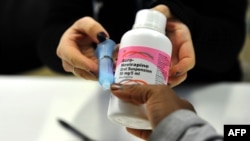BULAWAYO —
A large number of children on Anti-Retroviral drugs or ARVs in primary and secondary schools in Zimbabwe are struggling to come to terms with their HIV status as they are usually not well informed by their parents about why they are taking medication.
This has resulted in some of them refusing to take the ARVs.
Various organizations have revealed that children who are born HIV positive struggle to take ARVs as it is difficult for them to understand their health conditions.
According to Trevor Chirimambowa, projects manager of Million Memory Project Zimbabwe or MMPZ, fear and cultural beliefs are said to be the main reasons why parents and caregivers of children living with the HIV are reported to be hesitant in disclosing their status.
MMPZ is an organisation that focuses on the provision of psycho-social services for people living with HIV, including young children in Bulawayo.
Some efforts are being made by the Ministry of Education to tackle this issue. Provincial Education Director for Bulawayo Dan Moyo says they are currently running life skills programs in schools with the help of organisations such as Matabeleland AIDS Council in an effort to educate children on HIV/AIDS issues.
According to an 18-year-old young man from Bulawayo, who was born HIV positive, Mathew Banda, parents and guardians should inform their children about their HIV status.
Chirimambowa adds that disclosure of one’s HIV status is generally a big problem for most youths.
He further says youths who were born with HIV face more problems of disclosing their HIV status.
Banda, however, says he was able to come to terms with his status after receiving counselling and support from friends that he met at an MMPZ support group.
Another person, Mbekezeli Moyo, a 21-year-old young man from Bulawayo who was also born HIV positive, however, says his status is his secret and he only discloses it to close friends out of fear of discrimination.
According to Section 79 of the Criminal Law (Codification and Reform) Act, willful transmission of HIV is illegal in Zimbabwe. However, policy analysts say such cases are difficult to prove in a court.
UNICEF states that there were an estimated 105,740 children living with HIV in Zimbabwe at the end of 2009, with about 14,957 children between the ages of zero to 14 years newly infected in the same year.
This has resulted in some of them refusing to take the ARVs.
Various organizations have revealed that children who are born HIV positive struggle to take ARVs as it is difficult for them to understand their health conditions.
According to Trevor Chirimambowa, projects manager of Million Memory Project Zimbabwe or MMPZ, fear and cultural beliefs are said to be the main reasons why parents and caregivers of children living with the HIV are reported to be hesitant in disclosing their status.
MMPZ is an organisation that focuses on the provision of psycho-social services for people living with HIV, including young children in Bulawayo.
Some efforts are being made by the Ministry of Education to tackle this issue. Provincial Education Director for Bulawayo Dan Moyo says they are currently running life skills programs in schools with the help of organisations such as Matabeleland AIDS Council in an effort to educate children on HIV/AIDS issues.
According to an 18-year-old young man from Bulawayo, who was born HIV positive, Mathew Banda, parents and guardians should inform their children about their HIV status.
Chirimambowa adds that disclosure of one’s HIV status is generally a big problem for most youths.
He further says youths who were born with HIV face more problems of disclosing their HIV status.
Banda, however, says he was able to come to terms with his status after receiving counselling and support from friends that he met at an MMPZ support group.
Another person, Mbekezeli Moyo, a 21-year-old young man from Bulawayo who was also born HIV positive, however, says his status is his secret and he only discloses it to close friends out of fear of discrimination.
According to Section 79 of the Criminal Law (Codification and Reform) Act, willful transmission of HIV is illegal in Zimbabwe. However, policy analysts say such cases are difficult to prove in a court.
UNICEF states that there were an estimated 105,740 children living with HIV in Zimbabwe at the end of 2009, with about 14,957 children between the ages of zero to 14 years newly infected in the same year.




